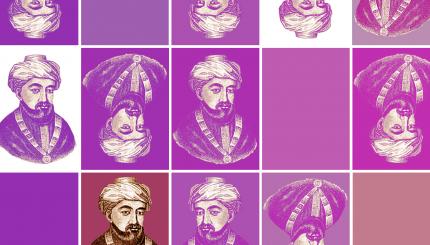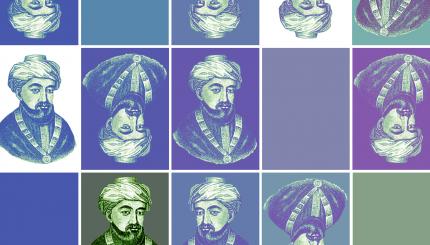Israel Salanter was a Lithuanian Talmudist and religious thinker (1810-83), founder of the Mussar movement. Israel’s family name was Lipkin, but he is known as Israel Salanter after the town of Salant in which he grew up and where he studied to become an outstanding Talmudic scholar (although he sought, wherever possible, to conceal his great learning).
A gifted teacher, he encouraged his disciples not to rely on him but to work things out for themselves. He once said that both the Hasidim and the Mitnagdim are in error: the Mitnagdim in that they believe they have no need for a Rebbe, the Hasidim in that they believe they have a Rebbe.
He was admired by the Hasidim, who used to say that the Mitnagdim had a Rebbe in Israel Salanter but failed to make the most of him.
A Life of Introspection
The picture that emerges from the accounts of Salanter’s life is one of a severely introspective personality, torn between a realization of his unworthiness and the compelling need to teach others how to strive for self-improvement.
Rabbi E. E. Dessler, Salanter’s great-grandson, reported that Salanter took literally the Talmudic injunction that a man has to get drunk on Purim. In his cups Salanter could be heard saying to himself: ‘If you have a mind capable of turning its thoughts this way and that, consider how tremendous is your responsibility.’
In his youth, Salanter came under the influence of Reb Zundel of Salant, from whom he obtained his particular stance, according to which mere mechanical performance of the precepts was totally inadequate to promote the good life as required by the Torah. Anticipating to some extent Freud’s ideas about the unconscious mind, Salanter believed that the only way to self-improvement was to penetrate the deeper recesses of the personality by which human beings are motivated.
Salanter stressed particularly the ethical demands of the Torah. A favorite saying of his was that one must not be frum (‘pious’) by standing on another’s shoulders (i.e. by overriding the feelings of other people in the pursuit of godliness).
It is said that he once met a pious Jew during the penitential period. This man was so engrossed in sombre reflection that he failed to greet Salanter, whereupon Salanter protested: ‘Because you are so pious does this give you the right to deny me my “Good morning”?’
The Mussar Movement
Salanter occupied no official Rabbinic position but served as Rosh Yeshivah (‘Head of a Yeshivah’) in a number of places, including the town of Kovno where he established a Yeshivah in the spirit of Musar.
It appears that Salanter did not originally intend that his Musar approach should be elitist but that it should promote greater inwardness in the lives of Jewish artisans and businessmen. However, eventually Salanter’s ideas were appreciated only by Yeshivah students, and Salanter’s disciples, encouraged by him, established Musar Yeshivot of their own.
At first there was determined opposition by traditional Rabbis to the introduction of Musar into the Yeshivah curriculum. The Torah itself, these Rabbis argued, was balm for the soul and there was no need to supplement study of the Torah with Musar. But Salanter’s ideas prevailed, so that the majority of the Lithuanian-type Yeshivot became Musar Yeshivot.
Spreading the Word
Salanter travelled to Germany and to Paris in order to increase awareness of traditional Judaism among German and French Jews. At one time he had the novel idea of translating the Talmud into German and wished to see the Talmud occupying an honored place in Semitic studies at European universities.
Towards the end of his life Salanter resided in Konigsberg. Typical of his approach is the story told of his last moments in Konigsberg. The community had arranged for a retainer to stay with him and Salanter, realizing that his death was nigh and that the retainer was terrified at the prospect of being left alone with a dead body, instead of spending the precious moments left to him in reflection on his end, devoted himself to reassuring the man that there is nothing to fear from a lifeless corpse.
Salanter’s biographers have noted that he had a morbid fear of fire. It is said that in order to remind himself of the terrors of Gehinnom he would put his little finger into the flame of a candle and say: ‘You see it hurts to be burned.’ As Salanter himself would have said, every man has a darker side to his personality.
Salanter remains one of the great spiritual figures of Lithuanian, and world, Jewry.
Reprinted from The Jewish Religion: A Companion, published by Oxford University Press.
frum
Pronounced: FROOM (oo as in hook), Origin: Yiddish, devout or pious, generally used to identify someone as Orthodox, or strictly observant of Jewish law.
Talmud
Pronounced: TALL-mud, Origin: Hebrew, the set of teachings and commentaries on the Torah that form the basis for Jewish law. Comprised of the Mishnah and the Gemara, it contains the opinions of thousands of rabbis from different periods in Jewish history.
Torah
Pronunced: TORE-uh, Origin: Hebrew, the Five Books of Moses.
Mussar
Pronounced: MOOS-ur (oo as in book), Origin: Hebrew,19th-century Lithuanian movement that sought to promote greater inwardness, religious piety, and ethical conduct among traditionally minded Jews.


